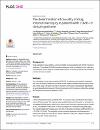The determination of causality of drug induced liver injury in patients with COVID-19 clinical syndrome

View/
Date
2022-09-01Author
Naseralallah, Lina MohammadAboujabal, Bodoor Abdallah
Geryo, Nejat Mohamed
Al Boinin, Aisha
Al Hattab, Fatima
Akbar, Raza
Umer, Waseem
Jabbar, Layla Abdul
Danjuma, Mohammed I.
...show more authors ...show less authors
Metadata
Show full item recordAbstract
Background Drug induced liver injury (DILI) is a rising morbidity amongst patients with COVID-19 clinical syndrome. The updated RUCAM causality assessment scale is validated for use in the general population, but its utility for causality determination in cohorts of patients with COVID-19 and DILI remains uncertain. Methods This retrospective study was comprised of COVID-19 patients presenting with suspected DILI to the emergency department of Weill Cornell medicine-affiliated Hamad General Hospital, Doha, Qatar. All cases that met the inclusion criteria were comparatively adjudicated by two independent rating pairs (2 clinical pharmacist and 2 physicians) utilizing the updated RUCAM scale to assess the likelihood of DILI. Results A total of 72 patients (mean age 48.96 (SD ± 10.21) years) were examined for the determination of DILI causality. The majority had probability likelihood of “possible” or “probable” by the updated RUCAM scale. Azithromycin was the most commonly reported drug as a cause of DILI. The median R-ratio was 4.74 which correspond to a mixed liver injury phenotype. The overall Krippendorf's kappa was 0.52; with an intraclass correlation coefficient (ICC) of 0.79 (IQR 0.72-0.85). The proportion of exact pairwise agreement and disagreement between the rating pairs were 64.4%, kappa 0.269 (ICC 0.28 [0.18, 0.40]) and kappa 0.45 (ICC 0.43 [0.29-0.57]), respectively. Conclusion In a cohort of patients with COVID-19 clinical syndrome, we found the updated RUCAM scale to be useful in establishing “possible” or “probable” DILI likelihood as evident by the respective kappa values; this results if validated by larger sample sized studies will extend the clinical application of this universal tool for adjudication of DILI.
Collections
- COVID-19 Research [849 items ]
- Medicine Research [1820 items ]

